
A big band or jazz orchestra is a type of musical ensemble of jazz music that usually consists of ten or more musicians with four sections: saxophones, trumpets, trombones, and a rhythm section. Big bands originated during the early 1910s and dominated jazz in the early 1940s when swing was most popular. The term "big band" is also used to describe a genre of music, although this was not the only style of music played by big bands.

Randolph Denard Ornette Coleman was an American jazz saxophonist, trumpeter, violinist, and composer. He is best known as a principal founder of the free jazz genre, a term derived from his 1960 album Free Jazz: A Collective Improvisation. His pioneering works often abandoned the harmony-based composition, tonality, chord changes, and fixed rhythm found in earlier jazz idioms. Instead, Coleman emphasized an experimental approach to improvisation, rooted in ensemble playing and blues phrasing. AllMusic called him "one of the most beloved and polarizing figures in jazz history," noting that while "now celebrated as a fearless innovator and a genius, he was initially regarded by peers and critics as rebellious, disruptive, and even a fraud."

Donald Eugene Cherry was an American jazz trumpeter. Beginning in the late 1950s, he had a long tenure performing in the bands of saxophonist Ornette Coleman, including on the pioneering free jazz albums The Shape of Jazz to Come (1959) and Free Jazz: A Collective Improvisation (1960). Cherry also collaborated separately with musicians such as John Coltrane, Charlie Haden, Sun Ra, Ed Blackwell, the New York Contemporary Five, and Albert Ayler.
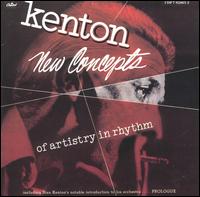
New Concepts of Artistry in Rhythm is an album by Stan Kenton. "Invention for Guitar and Trumpet" features guitarist Sal Salvador. A New York Times writer commented in 2003 that composer Bill Russo's "Improvisation" piece was "among the highest achievements in orchestral jazz".
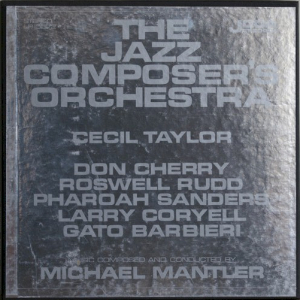
The Jazz Composer's Orchestra is a 1968 album by the Jazz Composer's Orchestra recorded over a period of six months with Michael Mantler as composer, leader and producer. Many of the key figures in avant-garde jazz from the time contributed on the album including Don Cherry, Pharoah Sanders, Gato Barbieri, Larry Coryell, Roswell Rudd, and Carla Bley. The album's finale features a two-part concerto for Cecil Taylor and orchestra.

Symphony for Improvisers is an album by American jazz trumpeter Don Cherry, released by Blue Note Records in August 1967. It features Gato Barbieri, Henry Grimes, and Ed Blackwell, all of whom appeared on Cherry's previous album Complete Communion, along with Karl Berger, Jean-François Jenny-Clark, and Pharoah Sanders. Symphony for Improvisers was recorded in 1966. The front cover photograph was taken at New York Public Library for the Performing Arts, Upper West Side, New York City.
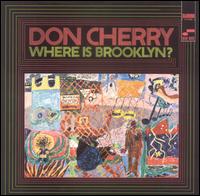
Where Is Brooklyn? is an album by Don Cherry featuring Henry Grimes, Ed Blackwell, and Pharoah Sanders recorded in 1966 and released on the Blue Note label.

Eternal Rhythm is a jazz album composed by Don Cherry. It was recorded in conjunction with the Berlin Jazz Festival in November 1968.
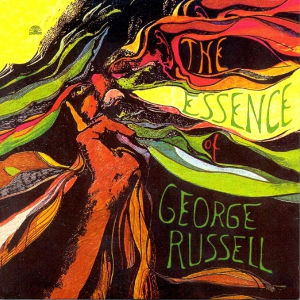
The Essence of George Russell is an album by American jazz composer and pianist George Russell originally released on the Swedish Sonet label in 1971, and subsequently reissued on the Italian Black Saint label in 1983. The album featuring performances by Russell with a large ensemble, mostly Nordic musicians, including Stanton Davis, Jan Garbarek, Terje Rypdal, Arild Andersen, Jon Christensen and orchestra.

Relativity Suite is a free-jazz LP by Don Cherry on Jazz Composer's Orchestra Records which was released in 1973.

Crisis is a live album by the American jazz saxophonist and composer Ornette Coleman recorded at New York University in 1969 and released on the Impulse! label.
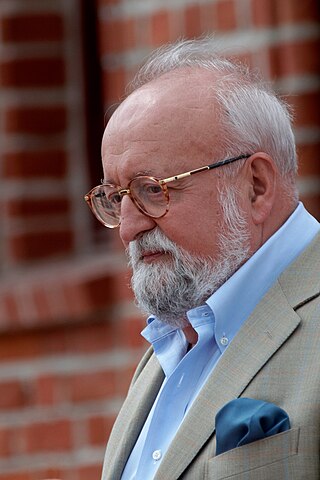
Anaklasis is a composition for 42 string instruments and percussion, composed in 1960 by the Polish composer Krzysztof Penderecki. It was first performed at the Donaueschingen Festival in 1960. At this first performance, it was well received by the audience who demanded an encore.
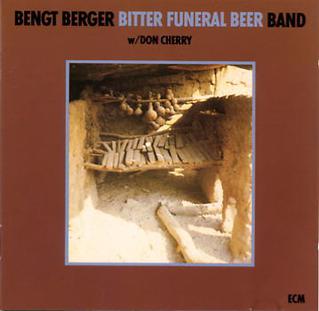
Bitter Funeral Beer is an album by the Bengt Berger Bitter Funeral Beer Band with Don Cherry recorded in January 1981 and released on ECM the following year.

The Art of the Improvisers is an album credited to jazz composer and saxophonist Ornette Coleman, released by Atlantic Records in 1970. The album was assembled without Coleman's input, comprising outtakes from recording sessions of 1959 to 1961 for The Shape of Jazz to Come, Change of the Century, This Is Our Music, Ornette!, and Ornette on Tenor. Recording sessions in 1959 took place at Radio Recorders in Hollywood, California; those in 1960 and 1961 at Atlantic Studios in New York City.

From Valley to Valley is a live album by the Die Like a Dog Quartet: saxophonist Peter Brötzmann, trumpeter Roy Campbell Jr., bassist William Parker, and drummer Hamid Drake. It was recorded in July 1998 at the Fire in the Valley festival held at the University of Massachusetts Amherst's Bezanson recital hall in Amherst, Massachusetts, and was released in 1999 by Eremite Records.

Live in Japan '96 is a live album by the Berlin Contemporary Jazz Orchestra. One track was recorded in July 1996 at Nakano Public Hall in Tokyo, while the remaining tracks were recorded in August 1996 at Shin-Kobe Oriental Theatre in Kobe. The album was released in 1997 by DIW. The music was conducted by Alexander von Schlippenbach and Aki Takase.
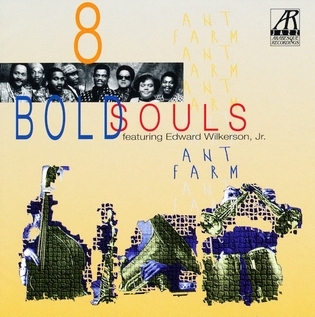
Ant Farm is the third album by the jazz group 8 Bold Souls. It was recorded in July and August 1994 in Chicago and was released later that year by Arabesque Records. The album features performances by saxophonist, clarinetist, and composer Edward Wilkerson, saxophonist Mwata Bowden, trumpeter Robert Griffin, Jr., trombonist Isaiah Jackson, tubist Aaron Dodd, cellist Naomi Millender, bassist Harrison Bankhead, and drummer Dushun Mosley.

Live Ankara is a live album by trumpeter Don Cherry. It was recorded in November 1969 at the US Embassy in Ankara, Turkey, and was released on LP in 1978 by Sonet Records. On the album, Cherry is joined by three Turkish musicians: saxophonist and percussion Irfan Sümer, bassist Selçuk Sun, and drummer Okay Temiz. The album was reissued by Sonet on CD in 1996, paired with Eternal Now, with the title The Sonet Recordings.

Harmos is an album by Barry Guy and the London Jazz Composers' Orchestra that features a recording of a large-scale, 44-minute composition by Guy. It was recorded in April 1989, just before the LJCO's 20th anniversary, in Zürich, Switzerland, and was released later that year by Intakt Records. Guy interpreted the Greek title in its original meaning of "coming together," and the work attempts to find solutions to the challenges surrounding the coexistence of improvisation and composition.

Double Trouble is an album by Barry Guy and the London Jazz Composers' Orchestra. Documenting a large-scale, 46-minute composition by Guy, it was recorded in April 1989 in Zürich, Switzerland, and was released in 1990 by Intakt Records.



















